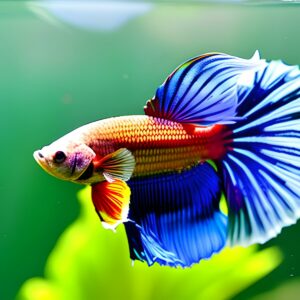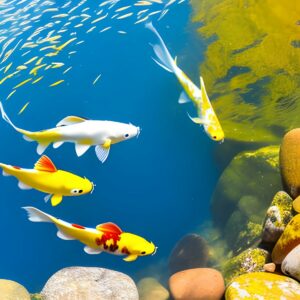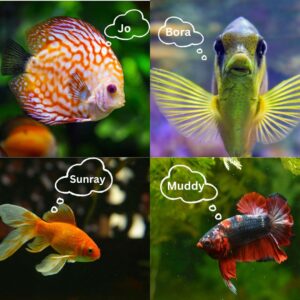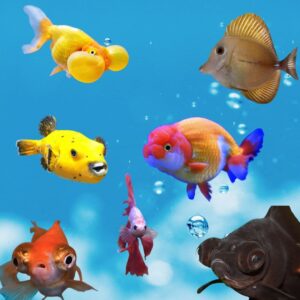I’ve always been fascinated by fish. As a child, I watched them swim in their tank. I loved their graceful movements and their vibrant colors.
One day, I noticed that my fish were all stationary at the bottom of the tank. I thought they were dead, but then my mum, an emergency veterinarian, explained that they were sleeping.
I was amazed to learn that fish sleep, just like humans do.
So in this piece, I will answer the popular question, Do pet fish sleep, and I’ll include more interesting facts about their sleep cycle and
Let’s dive.
Table of Contents
Do Pet Fish Sleep?
Unlike mammals, fish do not enter a state of complete inactivity during sleep. Instead, they experience a period of reduced activity, metabolic rate, and brain activity.
This resting period, often called fish “sleep,” is essential for their well-being and health maintenance.
The Mechanisms and Science of Fish Sleep

Fish sleep for many of the same reasons that humans sleep. Sleep helps fish to:
- Conserve energy
- Repair and regenerate tissues
- Learn and consolidate memories
During sleep, fish’s metabolic rate slows down, conserving energy, especially during periods of inactivity or food scarcity. This energy conservation mechanism allows fish to conserve vital resources and enhance their energy efficiency.
In addition to energy conservation, fish sleep plays a crucial role in tissue repair and regeneration. During this resting state, their brain activity decreases, allowing their bodies to focus on repairing and renewing damaged tissues. This cellular repair and regeneration is essential for maintaining physical health and promoting resilience to environmental stressors.
How do fish know when to sleep?
Fish have an internal circadian rhythm, a biological clock regulating sleep and wakefulness regulated by the brain.
The circadian rhythm is influenced by light and darkness, so fish tend to sleep more at night when it is dark.
However, fish can also adjust their sleep patterns to their environment. For example, some fish living in caves or deep-sea environments may have a different circadian rhythm than those living in shallower water.
What happens if fish don’t get enough sleep?
Just like humans, fish need to get enough sleep to stay healthy. When fish are sleep-deprived, they are more susceptible to disease, infection, and stress. They may also have difficulty learning and remembering.
Sleep VS resting states
Fish exhibit a variety of resting states, but these may not always be equivalent to the deep, restorative sleep experienced by mammals.
Some fish may simply slow down their activity levels without entering a state of reduced consciousness or brain activity.
This resting state may be more like a power-saving mode, allowing fish to conserve energy without fully shutting down their cognitive functions.
The role of the pineal gland
In mammals, the pineal gland regulates the sleep-wake cycle by secreting melatonin, a hormone that promotes sleepiness.
However, fish don’t have a pineal gland, which raises questions about how they regulate their sleep patterns. Researchers are still exploring the mechanisms involved in fish sleep.
Still, they rely on a combination of factors, such as external cues like light and water temperature, and internal mechanisms within their brains.
The importance of sleep for fish survival
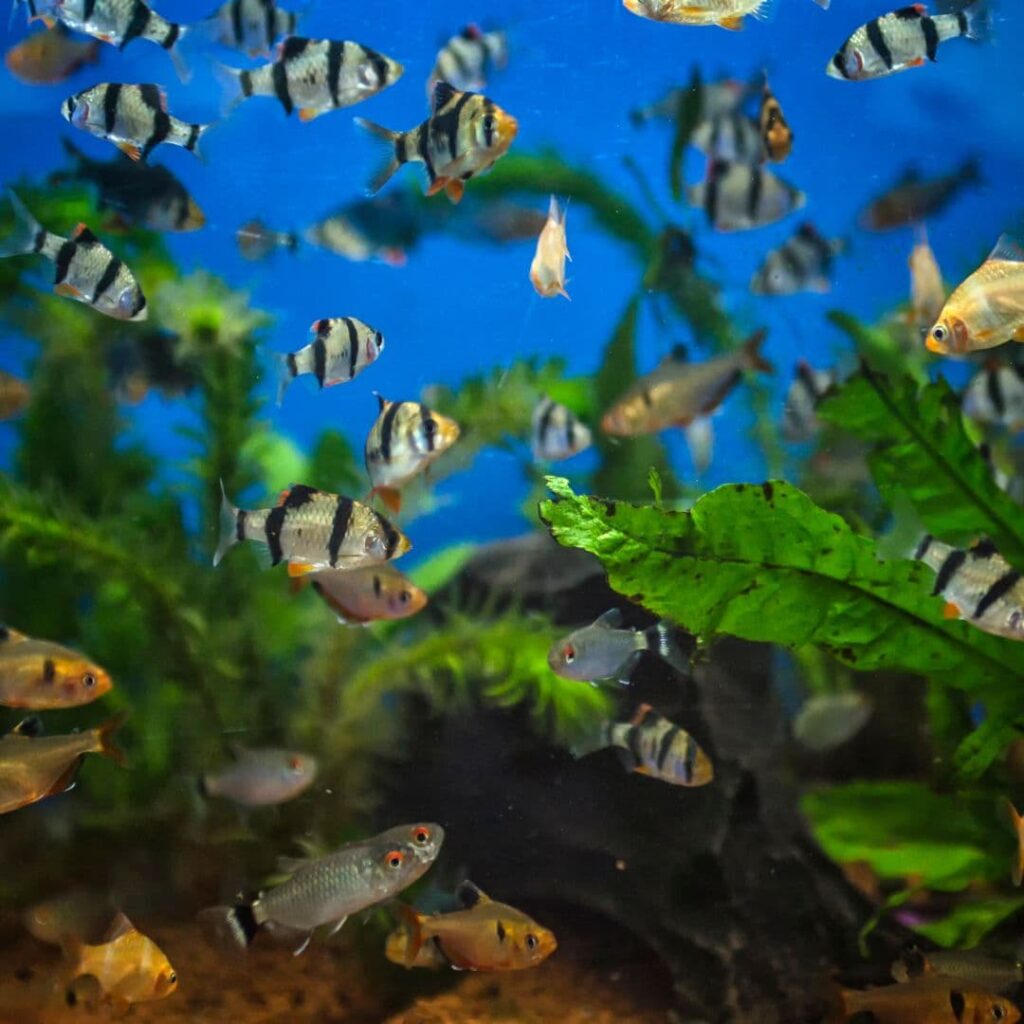
Sleep is crucial for fish survival despite the lack of a dedicated sleep regulator like the pineal gland. It is vital to their overall health and well-being by supporting various physiological processes. Sleep deprivation can have severe consequences for fish, including:
- Impaired learning and memory: Sleep is essential for consolidating memories and transferring short-term information to long-term storage. Sleep-deprived fish have difficulty learning new tasks and recalling previously learned information.
- Weakened immune system: Sleep is crucial for maintaining the immune system’s ability to fight off infections. Sleep deprivation can impair immune function, making fish more susceptible to diseases and illnesses.
- Reduced stress resistance: Sleep helps regulate stress hormones and promotes emotional stability. Sleep-deprived fish are more sensitive to stress, affecting their behavior, growth, and overall health.
The impact of environmental factors on sleep
Fish sleep patterns are influenced by various environmental factors, including:
- Light: Light cues play a significant role in regulating sleep-wake cycles in fish. Exposure to a regular light-dark cycle can help entrain their natural sleep-wake rhythms.
- Water temperature: Fish are ectothermic, meaning their environment regulates their body temperature. Changes in water temperature can disrupt their sleep patterns. Maintaining a stable water temperature is essential for promoting restful sleep.
- Social interactions: Fish are social creatures, and social interactions can influence their sleep patterns. Overcrowding or stressful social interactions can disrupt sleep. Providing a spacious tank and minimizing stress can help fish get the rest they need.
The role of behavior in sleep regulation
Fish exhibit subtle behavioral changes during sleep, including:
- Reduced movement: Fish become less active during sleep, reducing their swimming and foraging behavior.
- Altered posture: Some fish may adopt specific postures during sleep, such as lying motionless on the bottom or wedged into crevices.
- Changes in eye movement: In some species, eye movement may slow down or become less coordinated during sleep. In others, eye movement may cease completely.
How long do pet fish sleep for?
The amount of sleep that fish need varies depending on the species.
| Fish species | Hours of sleep |
| Betta fish | 8-12 hours per day |
| Goldfish | 8-12 hours per day |
| Neon tetras | 8-12 hours per day |
| Guppies | 8-10 hours per day |
| Molly fish | 8-10 hours per day |
| Platy fish | 8-10 hours per day |
| Corydoras catfish | 6-8 hours per day |
| Angelfish | 8-12 hours per day |
| Discus fish | 8-12 hours per day |
| Koi fish | 10-16 hours per day |
Common Sleep Patterns Among Aquarium Fish
While there is some variation in sleep patterns among different aquarium fish species, there are some common trends:
- Fish typically sleep more at night than during the day. This is because they are less active at night and are less likely to be disrupted by predators or other disturbances.
- Fish sleep more in colder water than in warmer water. This is because they can conserve energy more efficiently when they are cold.
- Fish sleep more when they are stressed. This is because sleep is a way for them to recover from stress and restore their energy levels.
Betta Fish
Betta fish are known for their vibrant colors and feisty personalities. They are also known for their unique sleep patterns. Betta fish do not exhibit the same deep, restorative sleep as mammals. Instead, they enter a state of reduced activity and consciousness called resting behavior.
During resting behavior, betta fish will often float motionless at the bottom of the tank or wedge themselves into crevices. Their eyes may be partially closed, and their gill movements will slow down.
Betta fish may also exhibit brief periods of active rest, where they may swim slowly or dart around the tank for a short period before returning to resting behavior.
Goldfish
Goldfish are another popular aquarium species that exhibit various sleep patterns. Some goldfish sleep similarly to betta fish, with periods of resting behavior interspersed with brief periods of active rest.
However, some goldfish may also enter deeper sleep states, where they become completely still, and their eyes may be closed. Goldfish sleep patterns can vary depending on the individual fish and the environmental conditions. However, most goldfish sleep for a total of 8-12 hours per day.
Koi Fish
Koi fish sleep similarly to goldfish, with periods of resting behavior and deeper sleep states. However, koi fish may also sleep on the water’s surface, with their heads out of the water. This is thought to be a way for them to get more oxygen, as water becomes less oxygenated at the surface. Koi fish typically sleep for 10-16 hours per day.
Molly fish
Are hardy and adaptable aquarium fish that can tolerate a wide range of water conditions. They are generally active during the day and sleep at night. Their sleep patterns may vary, but they typically sleep 8-10 hours daily.
Platy fish
Platy fish are small, colorful fish related to guppies and mollies. They are generally active during the day and sleep at night. Their sleep patterns may vary, but they typically sleep 8-10 hours daily.
Corydoras catfish
Corydoras catfish are peaceful and social bottom-dwelling fish known for their long whiskers. They are generally active during the day and sleep at night. Their sleep patterns may vary, but they typically sleep 6-8 hours daily.
Angelfish
Angelfish are large, colorful fish known for their graceful movements and long, trailing fins. They are generally active during the day and sleep at night. Their sleep patterns may vary, but they typically sleep 8-12 hours daily.
Discus fish
Discus are highly sought-after aquarium fish for their beautiful coloration and round, flat bodies. They are generally active during the day and sleep at night. Their sleep patterns may vary, but they typically sleep 8-12 hours daily.
How can I tell if my fish is sleeping?
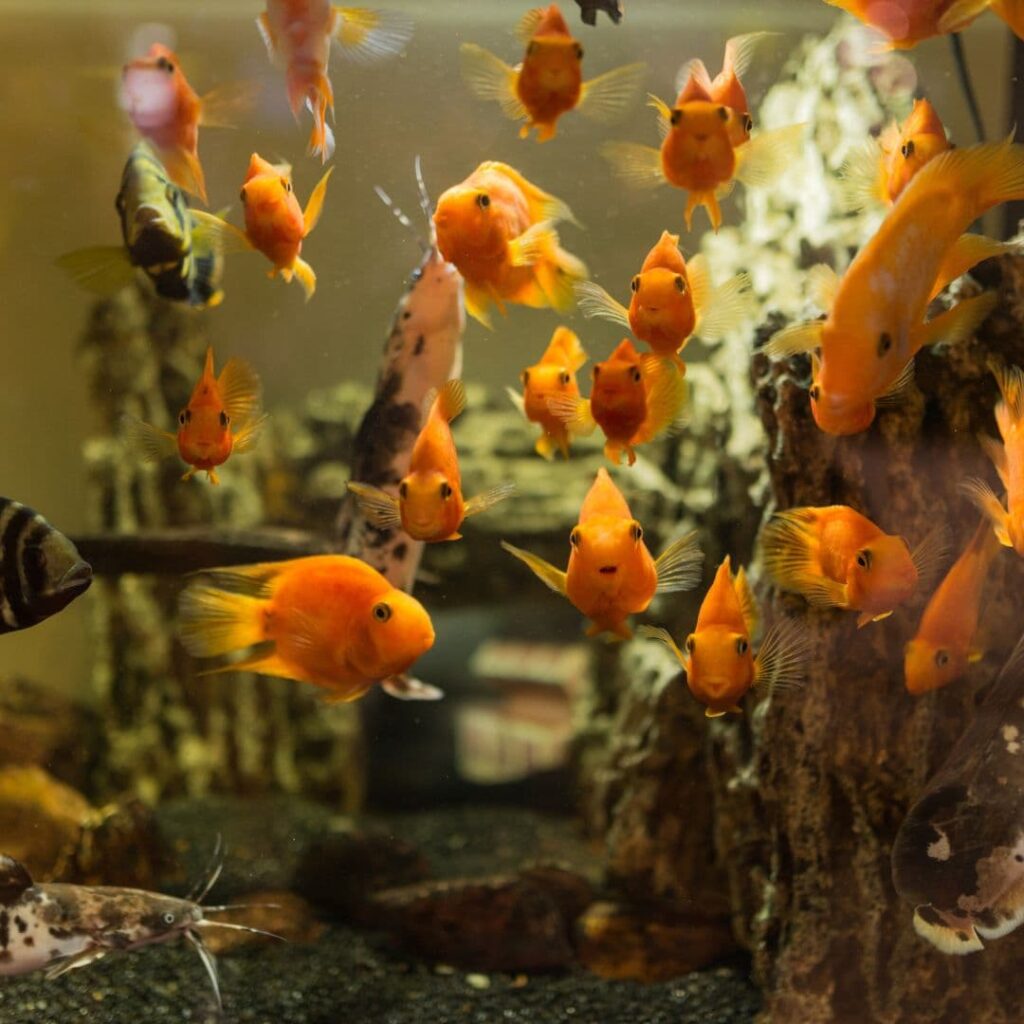
Observing your pet fish closely can provide valuable clues about their sleeping patterns.
Despite the lack of eyelids, fish’s eyes may exhibit subtle changes during sleep. Their eyes may become less responsive to movement or light, indicating a state of reduced consciousness.
Fish’s overall activity level also serves as a reliable indicator of sleep. When fish are in a resting state, they may become still and sluggish, exhibiting minimal movement. Some species may even adopt specific resting positions, such as lying motionless on the bottom of the tank or wedged into crevices or rocks.
There are a few things you can look for to determine if your fish is sleeping. Some common signs of fish sleep include:
- Stillness: Fish sleeping will become very still and not move around much.
- Reduced activity: Fish sleeping will have a reduced overall activity level. They may not chase food as often or explore their surroundings as much.
- Changes in posture: Some fish species will adopt specific sleeping positions, such as lying motionless on the bottom of the tank or wedged into crevices or rocks.
- Changes in eye movement: Fish sleeping may have their eyes closed or have reduced eye movement. Some fish species, such as sharks, may maintain constant eye movement even during sleep.
Optimal Sleep Environment for Your Pet Fish
- Maintain a regular light cycle: Mimic the natural day-night cycle by providing a consistent light schedule. This helps regulate their internal circadian rhythm and promotes regular sleep patterns.
- Provide hiding places: Fish need secure spots to retreat when they feel threatened or stressed. Caves, rocks, and plants can provide security and encourage resting behavior.
- Avoid overcrowding: Overcrowding can increase stress and interfere with fish sleep. Ensure your tank has an appropriate size for the number of fish you keep.
- Maintain water quality: Poor water quality can cause stress and affect fish sleep patterns. Regularly test and maintain your aquarium’s water parameters to ensure optimal conditions for your fish.
- Choose compatible tank mates: Incompatible fish species can cause stress and disrupt sleep patterns. Research compatibility carefully before adding new fish to your aquarium.
Can fish dream?
Scientists are still not sure whether or not fish dream. However, some research suggests that fish may experience similar brain activity patterns during sleep as mammals do while dreaming. This suggests that fish may be capable of dreaming, but more research is needed to confirm this.
Do all fish sleep?
Yes, all fish sleep. However, the specific sleep patterns of different fish species vary widely. Some fish sleep more than others, and some fish sleep more deeply.
My Senior Paws is a participant in the Amazon Services LLC Associates Program, an affiliate advertising program designed to provide a means for sites to earn advertising fees by advertising and linking to Amazon.com. We also participate in other affiliate programs which compensate us for referring traffic.

